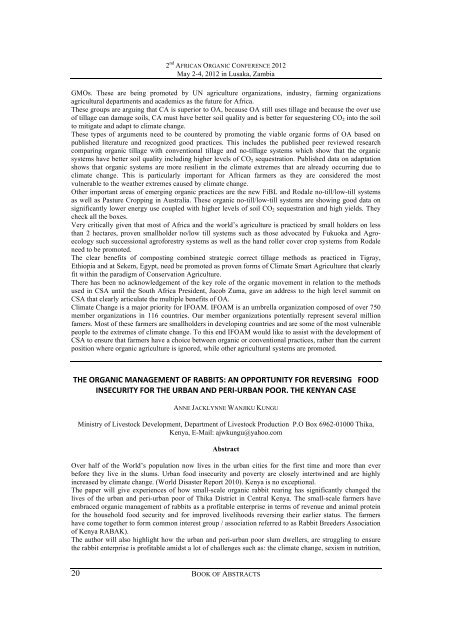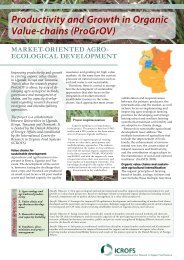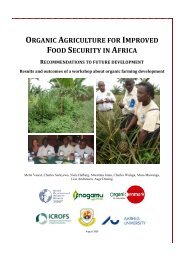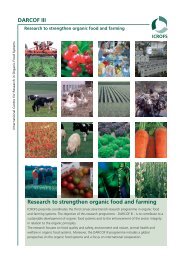The 2nd African Organic Conference â Mainstreaming ... - ICROFS
The 2nd African Organic Conference â Mainstreaming ... - ICROFS
The 2nd African Organic Conference â Mainstreaming ... - ICROFS
You also want an ePaper? Increase the reach of your titles
YUMPU automatically turns print PDFs into web optimized ePapers that Google loves.
2 nd AFRICAN ORGANIC CONFERENCE 2012<br />
May 2-4, 2012 in Lusaka, Zambia<br />
GMOs. <strong>The</strong>se are being promoted by UN agriculture organizations, industry, farming organizations<br />
agricultural departments and academics as the future for Africa.<br />
<strong>The</strong>se groups are arguing that CA is superior to OA, because OA still uses tillage and because the over use<br />
of tillage can damage soils, CA must have better soil quality and is better for sequestering CO 2 into the soil<br />
to mitigate and adapt to climate change.<br />
<strong>The</strong>se types of arguments need to be countered by promoting the viable organic forms of OA based on<br />
published literature and recognized good practices. This includes the published peer reviewed research<br />
comparing organic tillage with conventional tillage and no-tillage systems which show that the organic<br />
systems have better soil quality including higher levels of CO 2 sequestration. Published data on adaptation<br />
shows that organic systems are more resilient in the climate extremes that are already occurring due to<br />
climate change. This is particularly important for <strong>African</strong> farmers as they are considered the most<br />
vulnerable to the weather extremes caused by climate change.<br />
Other important areas of emerging organic practices are the new FiBL and Rodale no-till/low-till systems<br />
as well as Pasture Cropping in Australia. <strong>The</strong>se organic no-till/low-till systems are showing good data on<br />
significantly lower energy use coupled with higher levels of soil CO 2 sequestration and high yields. <strong>The</strong>y<br />
check all the boxes.<br />
Very critically given that most of Africa and the world’s agriculture is practiced by small holders on less<br />
than 2 hectares, proven smallholder no/low till systems such as those advocated by Fukuoka and Agroecology<br />
such successional agroforestry systems as well as the hand roller cover crop systems from Rodale<br />
need to be promoted.<br />
<strong>The</strong> clear benefits of composting combined strategic correct tillage methods as practiced in Tigray,<br />
Ethiopia and at Sekem, Egypt, need be promoted as proven forms of Climate Smart Agriculture that clearly<br />
fit within the paradigm of Conservation Agriculture.<br />
<strong>The</strong>re has been no acknowledgement of the key role of the organic movement in relation to the methods<br />
used in CSA until the South Africa President, Jacob Zuma, gave an address to the high level summit on<br />
CSA that clearly articulate the multiple benefits of OA.<br />
Climate Change is a major priority for IFOAM. IFOAM is an umbrella organization composed of over 750<br />
member organizations in 116 countries. Our member organizations potentially represent several million<br />
famers. Most of these farmers are smallholders in developing countries and are some of the most vulnerable<br />
people to the extremes of climate change. To this end IFOAM would like to assist with the development of<br />
CSA to ensure that farmers have a choice between organic or conventional practices, rather than the current<br />
position where organic agriculture is ignored, while other agricultural systems are promoted.<br />
THE&ORGANIC&MANAGEMENT&OF&RABBITS:&AN&OPPORTUNITY&FOR&REVERSING&&&FOOD&<br />
INSECURITY&FOR&THE&URBAN&AND&PERI:URBAN&POOR.&THE&KENYAN&CASE&<br />
ANNE JACKLYNNE WANJIKU KUNGU<br />
Ministry of Livestock Development, Department of Livestock Production P.O Box 6962-01000 Thika,<br />
Kenya, E-Mail: ajwkungu@yahoo.com<br />
Abstract<br />
Over half of the World’s population now lives in the urban cities for the first time and more than ever<br />
before they live in the slums. Urban food insecurity and poverty are closely intertwined and are highly<br />
increased by climate change. (World Disaster Report 2010). Kenya is no exceptional.<br />
<strong>The</strong> paper will give experiences of how small-scale organic rabbit rearing has significantly changed the<br />
lives of the urban and peri-urban poor of Thika District in Central Kenya. <strong>The</strong> small-scale farmers have<br />
embraced organic management of rabbits as a profitable enterprise in terms of revenue and animal protein<br />
for the household food security and for improved livelihoods reversing their earlier status. <strong>The</strong> farmers<br />
have come together to form common interest group / association referred to as Rabbit Breeders Association<br />
of Kenya RABAK).<br />
<strong>The</strong> author will also highlight how the urban and peri-urban poor slum dwellers, are struggling to ensure<br />
the rabbit enterprise is profitable amidst a lot of challenges such as: the climate change, sexism in nutrition,<br />
20<br />
BOOK OF ABSTRACTS





